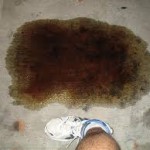[soundcloud url=”https://api.soundcloud.com/tracks/201914594″ params=”auto_play=false&hide_related=false&show_comments=true&show_user=true&show_reposts=false&visual=true” width=”100%” height=”450″ iframe=”true” /] Unless your driveway is ill, (in such cases you need to lay hands on it as well), it may save your life, not to mention big money to stop driving until you know what’s leaking.
Unless your driveway is ill, (in such cases you need to lay hands on it as well), it may save your life, not to mention big money to stop driving until you know what’s leaking.
I shutter to think, (transmission pun), of the times people thought it was an oil leak or a transmission leak and their brakes went out because it was a brake fluid leak. How do you tell when all you see is that oily mark? Lay down some, white plastic, like a kitchen garbage bag, underneath the car in the area that’s getting anointed on your drive way, (you need to place some stones or something to keep it from blowing) do this at night last thing. I say white because the color of the fluid is critical to determining its source and the white backdrop makes it easy to see the color. The plastic will allow it to not seep into anything and you can see how much is leaking. The next morning check your plastic before you move your car. Identify the color the location, quantity, and texture by placing some of the fluid on your finger.
Many a $1,000 shop bill could have been saved by a $7 owner’s manual, Had the right type of fluid been used.
Clear fluid (always smell clear fluids for fuel leaks)
If you it smells like gas, you guessed it, or Diesel and you own a diesel. Fuel leak. Use Extreme Caution: Stongly consider calling a tow truck, (my advice unless you really know what you’re doing).
With an oily texture, then it’s probably brake fluid, or in some cases hydraulic clutch fluid. Caution: Until you know for sure, don’t drive anywhere your brakes may fail, or your clutch. Look and see did the leak line up with the firewall of the car or near one of the wheels. Near the wheels then it’s probably brake fluid, get it fixed before you drive. If it’s at the firewall it could be either again you may want to call a wrecker to be safe.
In some cases it can be power steering fluid, you might check that as well, (see power steering under red fluids)
How does it smell and how thick is it? Burned smelling and thick and located behind the firewall, then no doubt its automatic transmission fluid, how much has leaked would tell you if it’s safe to drive. If it’s very little, then check your transmission fluid level per your owners manual, (don’t just check the dip stick) most have to be in park with the engine running and warm to be checked properly. Check your owner’s manual on selecting the right ATF (Automatic Transmission fluid) there are dozens of varieties and it is critical to the life of your transmission that you use the right one.
If it’s thinner and close to the front wheels, then check your power steering fluid level in most cases it just has a dip stick and doesn’t need to be running. If it’s low don’t drive before you have it at the right level. Caution: YOUR ABILITY TO STEER MAY BE SEVERLY HAMPERD. Again check your owner’s manual to insure you use the right power steering fluid. Don’t risk problems by using transmission fluid.
Green or Orange Fluid
Engine coolant or Anti-freeze is green or orange (usually) smells like maple syrup. The location of the spot on the plastic will help determine the source of the coolant leak. This one can also leave you stranded or worse cause and overheating, blown head gasket or even crack the head or engine block. Check your coolant level. If you need to add coolant be very careful and follow your owners manual on selecting the proper coolant for your vehicle. Caution: Mixing different coolants can cause severe engine damage. Again, if it leaked more than a 1/2 pint I would call a tow truck, unless you know what you’re doing.
Brownish Color Oil
Under the engine area, you guessed it, it is probably engine oil. Again check the dip stick before driving. Caution: driving your car low on oil can Cause Severe engine damage. Check your owner’s manual for the proper oil as well.
Under the transmission area, if it’s a manual transmission will probably be very thick and smell really bad. If there is much there then be very cautious manual transmissions don’t carry much gear oil, but they have to have it or they may freeze up from friction as well.
Under the real axle, similarly it’s differential gear oil. Caution limited slip differentials take a special fluid. Check your owner’s manual.
Some of the largest shop bills I have ever seen have been from people either using the wrong or contaminated fluid or the wrong or contaminated fuel. Check your owner’s manual before replacing or adding fluids. If you don’t have an owners manual get one. They are not expensive and available at the dealer of the brand you own. Wrecking yards keep them from the older vehicles and have a network to find you one. Many a $1000 shop bill could have been saved by a $7 owner’s manual.




